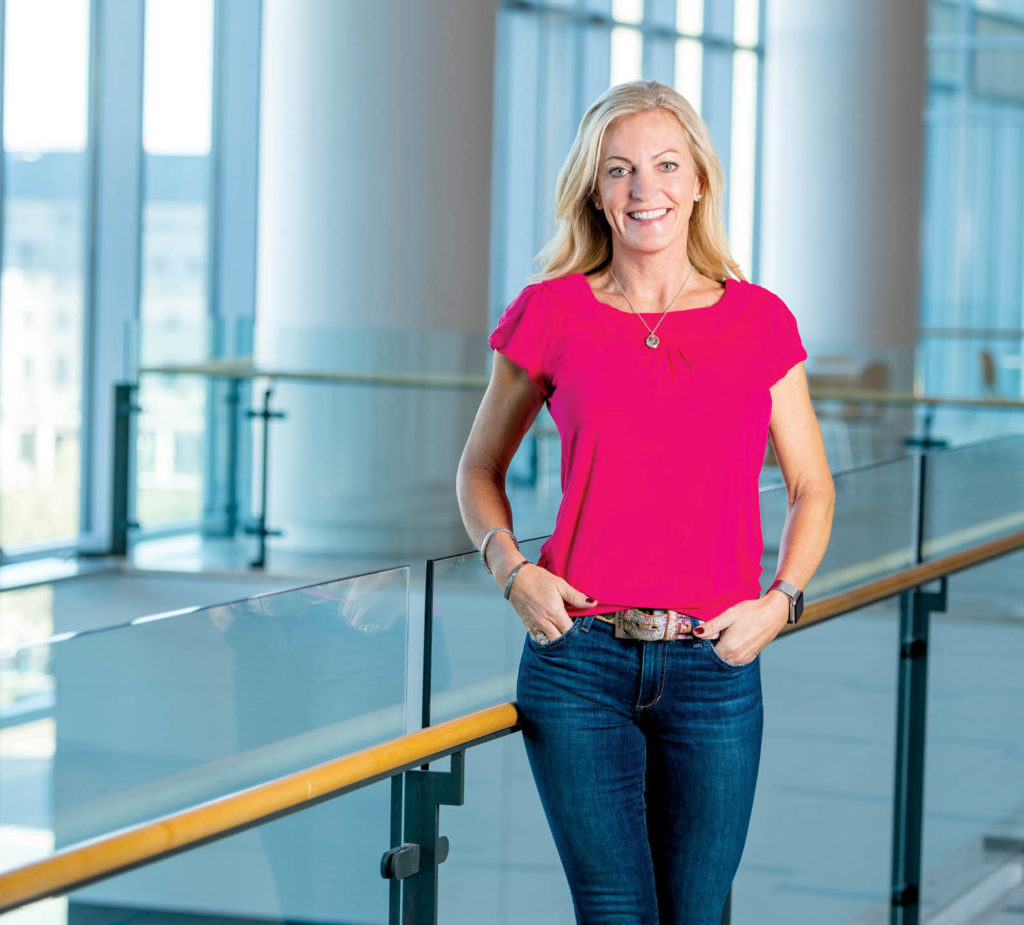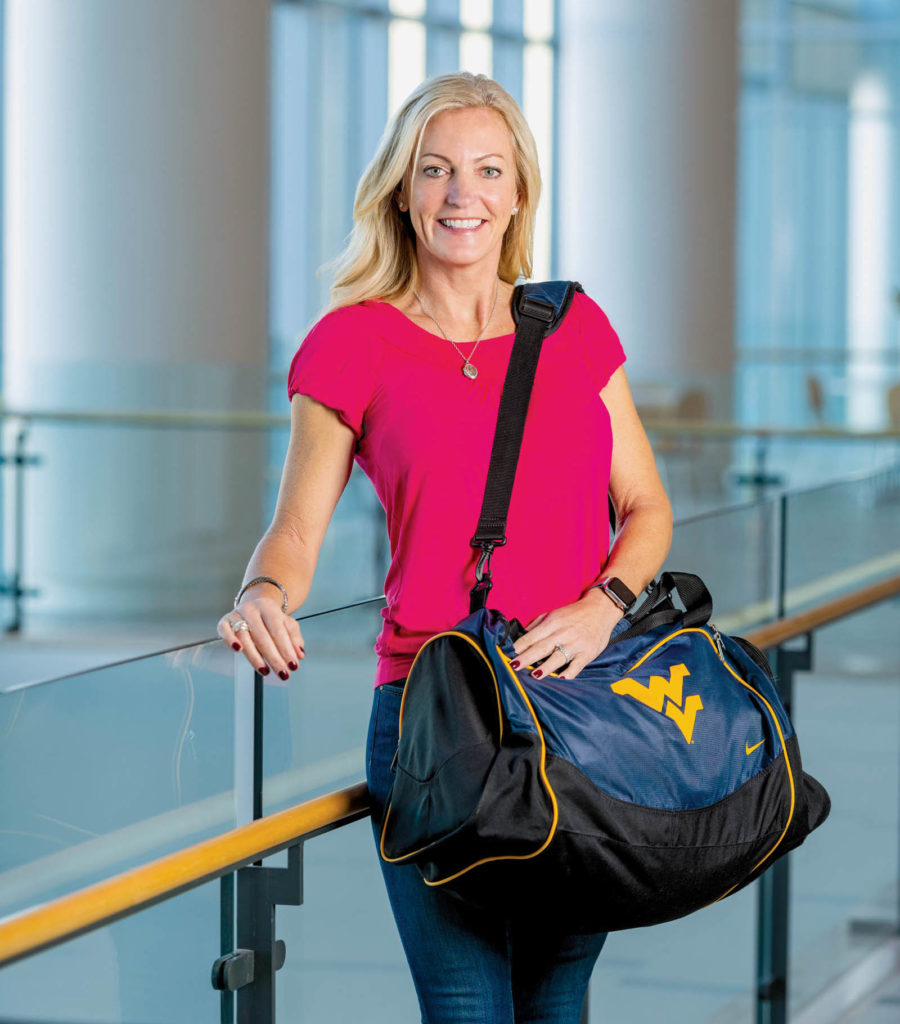
Like many textile entrepreneurs, Amy Bircher got her start in the industry in a family business—even as she blazed her own path.
“I got into the textile industry because my family owned a dyeing and finishing facility of wide fabric, broad-woven fabrics in the Carolinas,” Bircher says.
In 1980, the family bought National Dye Works, founded in Chicago, Ill., in 1942, eventually moving the company to South Carolina. Bircher spent her high school and college years working in the family business. When she graduated from West Virginia University, she moved to the West Coast to sell the family’s products there.
That was where, in 1997, she founded MMI—“It stands for me, myself and I”—as a manufacturer rep company.
“Now all of a sudden I have not just fabric to sell them, but I had hardware and webbing and other components to sell customers that were making end products,” she says. “I loved what I was doing and I really wanted to go off on my own and complement my dad’s business in the textile industry.”
Even as she grew MMI into a successful rep company, it turned out she wasn’t done with the family business. Her father had closed the company’s dye house in 2000 as more of that business went to other countries, becoming a converter and rebranding as NDW Textiles. In 2006, he asked Amy if she wanted to buy the company—a sale that became official on January 1, 2007.
“Now you’re talking about a business that we had purchased … and they were bigger than we were,” Bircher says. “So, that opened us up to worldwide selling because we had and still have customers all over the world now.”
Since 2007, MMI Textiles has quadrupled the business from NDW, while also adding product lines and continuing the manufacturer rep business.
“That’s just been a conduit, if you will, for us to harness our talents of being very resourceful and finding the right supplier,” she says. “So that portion of our business got started in the distribution model. From 1997 to 2007 we had a strong reps business model coupled with a growing product line of distributable products, of distribution lines where we actually, again, took possession of the receivable, versus it being a commission sale.”

Most recently, MMI opened a new manufacturing facility in Lenoir, N.C., in early 2021. The North Carolina factory focuses on manufacturing and printing narrow fabrics, including a full line of mil-spec webbing and binding tape products. That focus on innovation and finding new opportunities has helped MMI to grow even larger than Bircher ever expected.
“I would love to be able to sit here and tell you that I knew in 2021, after 25 years of doing business, that I would be the type of company, the size of company, the amount of revenue that we do, the processes and systems that we have in place. That’s not what I was thinking at 25 years old,” she says. “I was really just saying, ‘I’m pretty strong. I think I have natural entrepreneurial skills. I feel like I can be an effective leader. But more importantly I’m good at sales. So, I want to grow and gain the trust of customers and really make a difference on my own.’”
The secret to success for the MMI team has been to seek out and fill the needs of its customers. When Bircher and her team saw an opportunity, they grabbed it.
“Anybody’s lack of passion or excitement to innovate in our industry were opportunities for us,” Bircher says. “If someone else didn’t do a good job, or didn’t serve a customer or a market, or didn’t produce a product correctly, it was an opportunity for us. We exposed good opportunities and gained trust and built relationships with customers and the buyers.”
Membership in the Industrial Fabrics Association International (IFAI) has been a key part of building those relationships and helping move the company forward.
“You’re in this association that is all about really propelling the industry forward,” she says. “You cannot do that on your own. You have to be part of the greater good. The IFAI is that conduit.”
The way the association was able to bring companies together during the pandemic is a great example of that, Bircher says.
“When the pandemic first happened, our industry mobilized very quickly to support the PPE [personal protective equipment] needs of our country,” she says. “IFAI stepped up in a very difficult time for them as an association and reached out to all the members to push collaboration, advocacy and education on a product line (PPE) that was foreign to many. They were heroic and persistent in their endeavors, creating webinars for education, spearheading advocacy with state senators, giving them a stronger brand presence in our industry.”
Jonathan Sweet is IFAI’s Director of Content and Member Programs.
SIDEBAR: Q&A with Board Chair Amy Bircher
Q&A with IFAI board chair Amy Bircher
What are going to be your priorities as IFAI’s new board chair?
I would like to see the continuation of the strength and growth of IFAI as it has evolved into an association that is much bigger than what it had been historically. And what I mean by that is, IFAI and all of the team members within IFAI have worked really hard to bring brand awareness to people outside of IFAI, so that they are not just in specific markets that relate to awning, marine and tent. There’s nothing wrong with that, but they are so much more than just that and they’ve worked really hard on that identity.
One of the other things that we’d like to grow or do better is leadership development for the IFAI board, harnessing the future leaders that are interested in board participation. We’re going to start a more robust leadership development program from a board level to bring awareness that the opportunities to participate and the volunteer positions for the board exist.
What challenges is the industry facing, and how is IFAI supporting the industry in those challenges?
Obviously as a number one thing, is supply chain and logistics and price increases and things that the country is facing right now. But that’s countrywide, worldwide, no matter what industry you’re in.
I think our industry really has to be incredibly diligent on finding new people to replace the aging workforce. We have to get creative; we have to continue to have the discussions … about a mentor/mentee, or apprentice, and transfer that tribal knowledge, that invaluable knowledge. They’ve worked hard their entire career and they deserve to retire.
How do we get within that brain and transfer it to younger people to learn and grow so that we have people that want to be in this industry? I would say that’s a big challenge that the industry is facing, that is a long-term problem and not just something that is shorter term that we’re facing right now.
How is IFAI working toward remaining relevant to a changing industry?
It’s sometimes hard to adopt some of the new ways of thinking of the younger generations, but we have to…. I think we have to continue to be aware of the challenges you’re going to face from that workplace and be ready to adopt some changes.
Think about automation. I know a lot of people are talking about that to stay relevant and compete with overseas and look at the sustainability side of our industries. How do you appeal to younger people? If you put in sustainability practices and social awareness and social entrepreneurship with eco-friendly practices, that speaks to that generation and you’ve got to be an ambassador for that, for sure.
As a board member and now coming into the board chair position, how do you make sure that you know what the members are concerned about and worried about?
I’m trying to connect with the different divisions that we have right now on a personal level. I [recently participated] in a PAMA [Professional Awning Manufacturers Association] event to just connect and hear and meet them … just to connect with them, “Here’s who I am, I’m going to be your new board chair and I don’t know any of you. I’m not in the awning industry, but I’m here and I just want you to know who I am and to say hello.”
So, from my perspective, I would like to connect with the different division members and try to bring them into the fold of the IFAI as a whole, because I don’t want them to think, “OK, well, I’m just an awning company and I just want to stay here. And I’m sort of afraid to branch out and meet other people.” I think that’s fun for me, to try to be a connector.
If you look at our industry, what makes you optimistic and what are you excited about?
There are some unbelievably innovative programs that are being developed and implemented from a sustainability, eco-friendly side within our country. We have an opportunity from reshoring and sustainability put together, where we’re creating jobs, products and programs that are 100 percent made in the USA that are sustainable and employing Americans. If we can all come together and work hard together to keep that on the rails, I think we’ve got an exciting future in our industry.
SIDEBAR: Giving back
While Amy Bircher is proud of her business success, the IFAI chair’s most fulfilling moment was the 2021 dedication of the Amy A. Bircher Textiles Laboratory at the West Virginia University Davis College of Agriculture, Natural Resources and Design.
Bircher, a WVU alumna, donated more than $200,000 to establish the creative space for students. Through a variety of scientific testing—including the popular burn test which helps identify types of fabric—students will better understand what properties a fiber presents including its strengths, weaknesses, how it’s made, dyed and finished.
“To be able to give back to my school that gave me so many memories and a great educational experience was truly an honor,” Bircher says.
Amy Bircher, CEO & Founder
MMI Textiles Inc.
Westlake, Ohio
IFAI member since 2001
Most valued benefit: Networking—helping our industry learn from each other, collaborate and build relationships
 TEXTILES.ORG
TEXTILES.ORG


